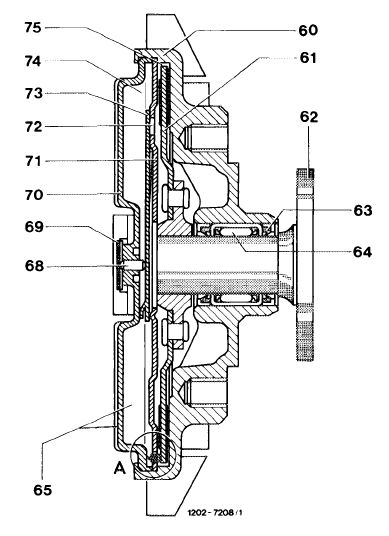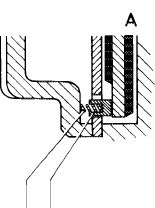Viscofan coupling, temperature-controlled
|
|
||||||||||||||||||||||||||||||||||||||||||||||||||||||||||||||||||||||||||||||||||||||||||||||||||
|
20—310 Viscofan coupling, temperature-controlled
|
||||||||||||||||||||||||||||||||||||||||||||||||||||||||||||||||||||||||||||||||||||||||||||||||||
|
|
||||||||||||||||||||||||||||||||||||||||||||||||||||||||||||||||||||||||||||||||||||||||||||||||||
|
Operation
|
||||||||||||||||||||||||||||||||||||||||||||||||||||||||||||||||||||||||||||||||||||||||||||||||||
|
|
||||||||||||||||||||||||||||||||||||||||||||||||||||||||||||||||||||||||||||||||||||||||||||||||||
|
The viscofan coupling is a service-free, hydraulic coupling which operates in dependence of temperature as well as infinitely variable.
When the engine is started (cold start) the fan will initially run at higher speed until the oil has flown back from the working chamber (75) to the reservoir (74) (approx. 1—3 minutes). The fan coupling will then switch off. The fan speed in disconnected condition depends on engine speed, but a fan speed of approx. 2100/min should not be exceeded.
This condition remains in force as long as the engine maintains its normal operating temperature.
If the coolant temperature increases as the result of the higher load or higher outside temperatures, the air which flows through the radiator and actuates the bimetallic strip will become warmer. The bimetallic strip (69) changes its shape under the increasing heat and opens at approx. 73 °C a valve by means of a control pin (68) and thereby the path of the oil from reservoir (74) into working chamber (75), so that the fan will be additionally engaged.
During this control operation, the coolant temperature is between 90 and 95 °C.
With the clutch engaged, the fan speed in lower speed range will increase approximately proportional with increasing engine speed, but will not exceed 3500/min in upper speed range.
|
 |
|||||||||||||||||||||||||||||||||||||||||||||||||||||||||||||||||||||||||||||||||||||||||||||||||
|
|
||||||||||||||||||||||||||||||||||||||||||||||||||||||||||||||||||||||||||||||||||||||||||||||||||
|
 |
|||||||||||||||||||||||||||||||||||||||||||||||||||||||||||||||||||||||||||||||||||||||||||||||||
|
67 66
|
||||||||||||||||||||||||||||||||||||||||||||||||||||||||||||||||||||||||||||||||||||||||||||||||||
|
|
||||||||||||||||||||||||||||||||||||||||||||||||||||||||||||||||||||||||||||||||||||||||||||||||||
|
|
||
|
Checking connecting temperature
|
||
|
|
||
|
Run engine at 4000—4500/min. As soon as a coolant temperature of 90 to 95 °C is attained, the fan speed should increase by approx. 1000/min, which can be clearly noticed acoustically.
|
||
|
|
||
|
Reconditioning
|
||
|
|
||
|
A defective coupling cannot be repaired with workshop equipment and a new coupling should therefore be installed.
|
||
|
|
||
|
Transportation and storage
|
||
|
|
||
|
Temperature-controlled viscofan couplings should be transported and stored vertically. For short periods — e.g. during assembly — the coupling may rest on its flange, but never on front end.
|
||
|
|
||
|
20.8-310/2 F2
|
||
|
|
||